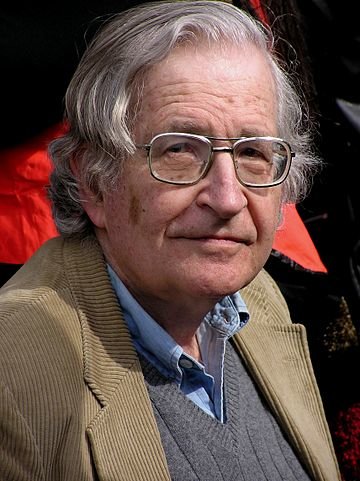מורשת גדולי האומה
בזכותם קיים
beta
Noam Chomsky: The Mind and Legacy

Noam Chomsky's legacy is multifaceted, encompassing groundbreaking contributions to linguistics and a long history of political activism. His ideas on universal grammar continue to influence linguistics, while his outspoken critiques of American foreign policy and defense of free speech remain subjects of debate and admiration. Chomsky's intellectual and political journey has left an enduring imprint on academia and public discourse alike.
Noam Chomsky, full name Avram Noam Chomsky, is a renowned American linguist, philosopher, historian, political activist, and social critic of Jewish descent. Born on December 7, 1928, in Philadelphia, Pennsylvania, Chomsky has left an indelible mark on various academic fields, most notably linguistics, and has also played a prominent role in shaping political discourse with his anarchist-syndicalist and libertarian socialist viewpoints.
Chomsky married Carol Doris Schatz, a fellow linguist, in 1949, and they had two sons and a daughter. His wife, Carol, was also a historian. Tragically, she passed away from cancer in December 2008.
Academic Accomplishments:
Chomsky holds the esteemed title of Honorary Professor of Linguistics at the University of Arizona and is also an Emeritus Professor of Linguistics at the Massachusetts Institute of Technology (MIT), where he taught for over five decades. He is recognized for founding the field of generative linguistics and introducing the Chomsky hierarchy, a system for classifying formal languages. His contributions to generative linguistics have earned him a prominent place in the academic world, with more than a hundred books and numerous scholarly articles to his name.Universal Grammar Theory:
One of Chomsky's most influential ideas is the concept of "universal grammar," which posits that all humans are born with an innate linguistic faculty that underlies the acquisition of language. This theory has reshaped the field of psycholinguistics, challenging earlier notions that humans are blank slates when it comes to language learning. Chomsky argued that humans have an inherent predisposition to seek linguistic input, allowing them to acquire language rapidly and efficiently through exposure and learning. This perspective has significantly impacted cognitive science.Political Activism:
Chomsky is as well-known for his political activism as for his linguistic theories. He emerged as a vocal opponent of U.S. intervention in Vietnam, which he characterized as American imperialism, gaining international attention in 1967 with his essay "The Responsibility of Intellectuals." Aligned with the "New Left," Chomsky's activism led to his arrest multiple times in the United States, and he found himself on Richard Nixon's list of enemies. Collaborating with Edward S. Herman, Chomsky formulated the propaganda model of media criticism in their book "Manufacturing Consent," which critiqued media's role in shaping public opinion.Free Speech Advocacy:
Chomsky's staunch defense of free speech, even for Holocaust deniers, sparked controversy during the 1970s and 1980s. He argued that freedom of expression is a fundamental principle, even when it means defending unpopular or offensive views. This position further highlighted his commitment to civil liberties.Later Activism:
Even after retiring from MIT, Chomsky remained an active political voice. He strongly opposed the Iraq War and supported the Occupy Wall Street movement in the aftermath of the 2008 global economic crisis.Personal Life:
Noam Chomsky was born into a Jewish family in Philadelphia. His father, William Chomsky, emigrated from Poland to the United States at the age of 18 to avoid military conscription, while his mother, Elsie Simonofsky Chomsky, was a Russian-Jewish immigrant. Chomsky and his brother, David, were raised with a strong emphasis on Hebrew and Zionism. He briefly contemplated moving to Israel at one point in his youth.Chomsky married Carol Doris Schatz, a fellow linguist, in 1949, and they had two sons and a daughter. His wife, Carol, was also a historian. Tragically, she passed away from cancer in December 2008.
- נועם חומסקיhe.wikipedia.org